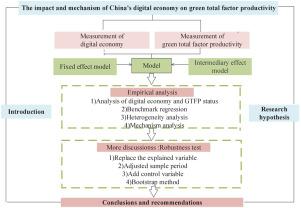数字经济对绿色全要素生产率的影响及机制--来自中国的经验证据。
IF 8
2区 环境科学与生态学
Q1 ENVIRONMENTAL SCIENCES
引用次数: 0
摘要
在全球数字化背景下,推动数字经济发展对减少碳排放、提高绿色全要素生产率(GTFP)具有重要意义。本研究基于 2011-2021 年中国 30 个省份的数据,构建了超级-SBM 模型、固定效应模型和中介效应模型等多种方法,实证检验了数字经济(DIE)对全要素生产率的影响和作用机制。研究结果表明,数字经济的发展促进了 GTFP 的提高。此外,中国东部地区数字经济(DIE)对GTFP的影响大于中西部地区。东部、中部和西部地区的 DIE 发展水平与 GTFP 之间存在明显差异。进一步的研究表明,数字经济通过经济规模、产业结构和技术创新三个中介变量影响 GTFP 的提高。本研究为发展中国家随着数字经济的发展有效提高 GTFP 提供了实证支持。它为发展中国家和新兴经济体发展绿色经济提供了有效建议。然而,本研究在数据样本、研究范围和机制分析深度方面存在局限性。因此,本研究得出的结论只能在一定程度上为识别 DIE 与 GTFP 之间的关系提供经验证据。未来的研究应在这些方面进一步拓展。本文章由计算机程序翻译,如有差异,请以英文原文为准。

The effect and mechanism of digital economy on green total factor productivity — Empirical evidence from China
In the context of global digitalization, it is of great significance to promote the development of digital economy to reduce carbon emissions and improve green total factor productivity (GTFP). Based on the data of 30 provinces in China from 2011 to 2021, this study constructs a variety of methods, such as Super-SBM model, fixed effect model and intermediary effect model, to empirically test the impact and mechanism of digital economy (DIE) on GTFP. Based on the research findings, the growth of DIE contributes to the improvement of GTFP. Moreover, the impact of DIE on GTFP in eastern China is greater than that in central and western China. There are significant differences between the development level of DIE and GTFP in eastern, central and western regions. Further research shows that digital economy affects the improvement of GTFP through three intermediary variables: economic scale, industrial structure and technological innovation. This study provides empirical evidence to support the effective enhancement of GTFP in developing countries as the digital economy evolves. It provides effective recommendations for developing countries and emerging economies to develop a green economy. However, this study has limitations in data sample, research scope and mechanism analysis depth. Therefore, the conclusions drawn in this study can only provide empirical evidence for identifying the relationship between the DIE and GTFP to a certain extent. Future research should be expanded in these aspects.
求助全文
通过发布文献求助,成功后即可免费获取论文全文。
去求助
来源期刊

Journal of Environmental Management
环境科学-环境科学
CiteScore
13.70
自引率
5.70%
发文量
2477
审稿时长
84 days
期刊介绍:
The Journal of Environmental Management is a journal for the publication of peer reviewed, original research for all aspects of management and the managed use of the environment, both natural and man-made.Critical review articles are also welcome; submission of these is strongly encouraged.
 求助内容:
求助内容: 应助结果提醒方式:
应助结果提醒方式:


